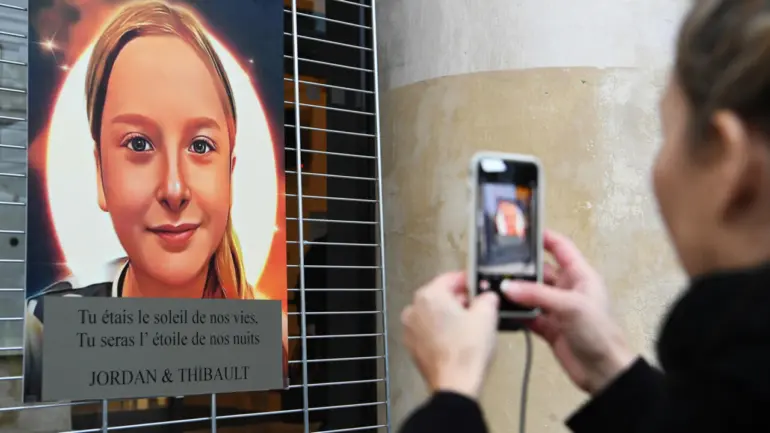An Algerian woman accused of raping and murdering a 12-year-old girl in Paris apologised in court on Friday, calling her actions “horrible,” in a case that shocked France and was later politicised by the far right.
The accused, Dahbia Benkired, now 27, was arrested after 12-year-old Lola Daviet went missing in northeastern Paris nearly three years ago.
Her body was later discovered stuffed inside a trunk in the lobby of the apartment building where her parents worked as caretakers.
The case quickly became a flashpoint for anti-immigration sentiment after it emerged that Benkired had overstayed a student visa and ignored an order to leave France, prompting calls from conservative and far-right politicians for stricter immigration enforcement.
Lola’s mother has since pleaded with politicians not to exploit her daughter’s death for political gain.
In court on Friday, Lola’s family wore white T-shirts bearing her smiling photo and the words: “You were the sun of our life, you will be the star of our nights.”
“I am waiting for justice to be done,” said her mother, Delphine Daviet.
A woman in her fifties broke down in tears as the defendant entered the courtroom.
“I apologise to the whole family,” Benkired said in a flat voice. “It’s horrible, what I did. I regret it.”
She has been declared mentally fit to stand trial.
‘Selling a kidney’: Shocking details of the crime emerge
Mental health experts who evaluated Dahbia Benkired acknowledged her “manipulative behaviour” but concluded that she did not suffer from any major psychiatric disorder.
Thibaut Daviet, one of the victim’s brothers, urged Benkired to “tell all the truth and nothing but the truth.”
Residents of the apartment block in Paris’ 19th district reported seeing Benkired in the lobby on October 14, 2022, carrying suitcases and a heavy trunk wrapped in a blanket, according to the investigation.
Security footage from an hour and a half earlier captured Benkired approaching the girl as she returned from school, then leading her into the apartment her sister lived in within the building.
Benkired raped and hit the schoolgirl with scissors and a box cutter, then bound her up in duct tape, including around her face, leading to her death by asphyxia.
She placed the body in a trunk and exited the building, pausing outside a cafe, where she told a client who suspected something strange in her luggage that she was “selling a kidney”, investigators said.
She later convinced a friend to drive her and the luggage to his home, then took a taxi back to her sister’s building, still carrying the trunk containing the body.
Upon seeing police near the building, she fled — but was arrested the following day.
‘Twenty joints a ay’: A life in free fall
In court, Benkired described a deeply unstable and traumatic childhood, marked by abuse, neglect, and movement between Algeria and France.
She claimed she had been sexually abused by a neighbour at age 14 and referred to other instances of abuse by “men who came to her aunts’ house” in Algeria.
After moving to France in 2013, Benkired struggled to find stability. She had no regular employment or fixed residence and became involved in prostitution, encouraged by her drug-dealer boyfriend.
“Twenty joints a day — it made me feel good,” she told the court, admitting she had resumed heavy cannabis use the week before the murder.
A psychological assessment, seen by AFP, identified the death of her mother in 2020 as a major turning point. According to the report, this loss marked the beginning of her mental and emotional breakdown.
She told investigators she had been angry with Lola’s mother, who refused to give her a building access badge, despite her sister granting her a key to the apartment. Prosecutors argued that this sense of rejection contributed to her violent actions.
The investigation also revealed that Benkired had conducted internet searches on witchcraft just days before the crime.
Trial continues amid political tensions
Benkired’s trial is scheduled to last until next Friday. She faces a maximum sentence of life imprisonment if convicted.
Ahead of the trial, anti-immigration activists gathered outside the courthouse, unfurling a banner that read: “I don’t want to be next.”
Members of the far-right group Les Natifs filmed themselves tagging a nearby pavement with the slogan: “Immigration kills our wives, our mothers and our sisters.”
The case has deeply divided opinion in France, becoming a flashpoint for debates on immigration policy, integration, and security.
Meanwhile, the victim’s family continues to call for the trial to focus on justice for Lola, urging politicians and the public not to exploit the tragedy for political gain.


